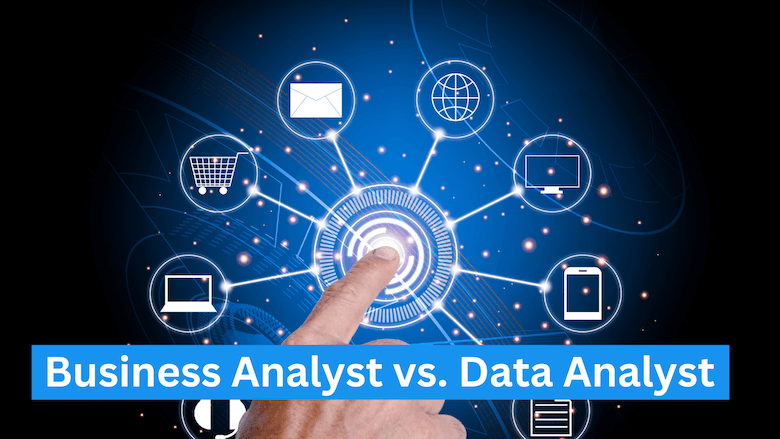

Ask questions about this lesson and get instant answers.
In this article, we will discover what business analysts and data analysts do and how these two professions differ from one another.
Business analysts and data analysts are both very popular career options in the industry, but they differ greatly from one another. As opposed to data analysts, who analyze business data to produce reports and dashboards for business users, business analysts are primarily involved in the software development process.

In a software development project, a business analyst serves as an intermediary between the business team and the technology team. Consider a scenario where a sizable IT services provider is creating loan servicing software for a bank. As a business analyst, your role would be to work with the key stakeholders and business users in the bank to understand their requirements for the software.
The business analyst's job will be to understand the needs of these users, understand the processes in the bank, prepare the requirements document and communicate and work with the technology team to provide and explain these requirements to them so that they can develop the software as per the requirements. As a part of their job, the business analyst will also create mockups, use cases, test cases, etc., that will help the tech team build a robust software.
A data analyst, as the name suggests, analyses data. A data analyst works with data to create dashboards and reports for business users. Let’s take a bank’s loan department as an example. The bank’s senior management will want regular reports on how the business is doing. For example, they may want loan disbursal details by region. They may also want reports on how different marketing channels are performing. Along with this, they may also want a snapshot view of the business in current month viz-a-viz previous month, % of bad loans, and so on.
Since a bank completely works on IT systems, all this data is available in various systems and databases. The data analyst sits in the middle of this data and the business users and prepares the dashboards and reports as requested by the business users. Unlike a business analyst, a data analyst doesn’t just gather the requirements and send it to someone else to prepare these insights. He is actually responsible for creating these dashboards and reports.
Data analysts use various software to create these dashboards. The most common software is Microsoft Excel. The data analyst can pull all the required data in excel sheets and then prepare dashboards, reports, graphs, etc. as per the requirements and share them with business users for their perusal. Nowadays, there are many sophisticated software available, such as Power BI, QlikView, Tableau, etc., that make it easy to connect data from different sources and prepare powerful, real-time reports.
As you can see, both these roles are very different from each other. To become a good business analyst, you need to have a solid understanding of the domain in which the software is being built, and you also need to be good with technology. Someone who understands the industry, has domain knowledge, and understands technology will make a good business analyst. Also, since a business analyst works with business users and clients, they need to have good communication skills. This includes both written communication and verbal communication. It’s the business analyst who gathers the requirements from clients and passes it on to the tech team for development. Having a business analyst with poor communication skills can lead to a bad software.
To become a good data analyst, you need strong domain knowledge. Since it’s your job to understand what data and report a business user wants, it’s important that you have a good understanding of the business, so that you can work with the right data to prepare reports that answer the user’s questions. Apart from that, since a data analyst has to actually prepare the dashboards and reports they need to have good tech skills. They need to be hands-on with various technologies such as Excel, databases, SQL, and any other software that is used in their organization, such as Tableau, Power BI, QlikView, etc. Sometimes, a data analyst may also need to do some programming to prepare data as per their needs. Apart from this, a data analyst will also benefit from having a good design sense. Business users have to use these reports on a daily basis. If these reports look beautiful, and have a sense of consistency and design, that could make a pleasant experience. Sometimes, a data analyst’s role also includes presenting these reports to management, in such case, having good communication skills can help.
I hope this article gave you a good understanding of the roles of business analyst and data analyst, and how they differ from each other.